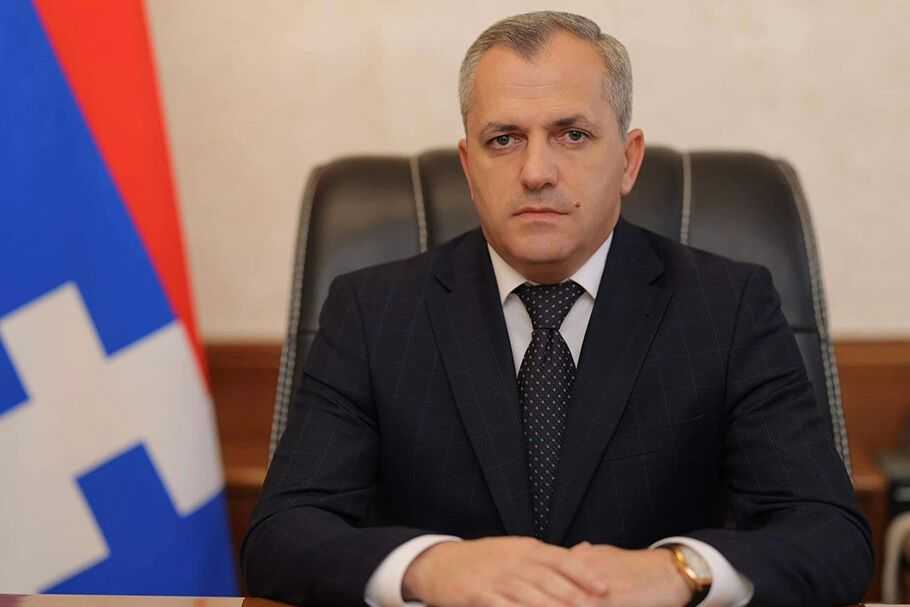
Nagorno-Karabakh’s Parliament has elected Samvel Shahramanyan as the region’s new president. Officials have expressed hope that he will be able to achieve a ‘breakthrough’ in the region’s negotiations with Azerbaijan, which has held Nagorno-Karabakh under blockade for over nine months.
Sharhamanyan was elected in an extraordinary session on Saturday.
According to CivilNet, 23 members of parliament took part in the voting, with 22 voting for Shahramanyan and one against.
Four out of five factions of Nagorno-Karabakh’s parliament on Wednesday nominated Samvel Shahramanyan for the post of president. He was appointed to the position of State Minister a day before Arayik Harutyunyan’s resignation from the post of president.
An application by the United Motherland parliamentary faction to nominate Samvel Babayan, the faction’s leader, was rejected on the grounds that Babayan had not permanently lived in Nagorno-Karabakh for the past ten years, a requirement for presidential candidates. Speaking to RFE/RL on Monday, Babayan stated that his parliamentary faction would not participate in the vote, instead holding a protest against the ‘predetermined’ election in Stepanakert.
However, the votes of the remaining four factions were enough to elect Shahramanyan, as the constitution of Nagorno-Karabakh requires the votes of two thirds of MPs to elect a president.
Who is Samvel Shahramanyan?
Samvel Shahramanyan, 44, is believed to be close friends with Bako Sahakyan, the third president of Nagorno-Karabakh. In 2018, during his presidency, Sahakyan appointed Shahramanyan as director of the National Security Service.
Shortly after Arayik Harutyunyan was elected president in 2020, Shahramanyan was appointed head of the newly-created Ministry of Military Patriotism, Youth, Sports, and Tourism. In January 2023, Shahramanyan was appointed secretary of Nagorno-Karabakh’s Security Council, and was amongst those participating in meetings between representatives of Nagorno-Karabakh, Azerbaijan, and Russian peacekeepers on 1 March.
A number of MPs have stated their belief that Shahramanyan can bring together opposing groups in society, and could potentially bring about a ‘breakthrough’ in the ongoing blockade, having previously engaged in discussion with Azerbaijan. Nagorno-Karabakh has been under blockade by Azerbaijan since December 2022, with international and local groups increasingly warning that the region is experiencing an acute humanitarian crisis.
[Read more: ‘Bread is all we have’: Nagorno-Karabakh’s population faces threat of starvation]
Political analyst Tigran Grigoryan told CivilNet that Shahramanyan would not be independent, instead representing a political group consolidated by Ruben Vardanyan, the billionaire former State Minister. Harutyunyan’s resignation came soon after former state minister Ruben Vardanyan demanded he step down.
‘Now the decision-making process will take on a more collective nature’, said Grigoryan. ‘Most likely the former presidents, Ruben Vardanyan and their entourage will rule the country through a joint decision-making process.’
Reasons for Harutyunyan’s resignation
Arayik Harutyunyan resigned on 1 September, a day after firing the region’s second most senior official, State Minister Gurgen Nersisyan. In his statement Harutyunyan suggested that holding on to the post could be an impediment to negotiations with the Azerbaijani government.
Just 10 days before his resignation, Harutyunyan signed into law changes that allowed his successor to be appointed by parliament, rather than through a public election.
The changes state that during martial law, if a president leaves office early then parliament should appoint a replacement to carry out the remainder of their term. Nagorno-Karabakh has been under martial law since the Second Nagorno-Karabakh War, and Haratunyan’s current term was due to end in 2025.
Harutyunan’s resignation has been discussed within the region since the end of the Second Nagorno-Karabakh War, with the president initially promising to resign once the situation had ‘normalised’.
Harutyunyan was also associated with Armenian Prime Minister Nikol Pashinyan, with some opposition members suggesting that Harutyunyan’s departure could remove ‘obligations’ to the Armenian PM. When he was elected, Harutyunyan was seen as being close to the Armenian PM, though their relationship later soured.
For ease of reading, we choose not to use qualifiers such as ‘de facto’, ‘unrecognised’, or ‘partially recognised’ when discussing institutions or political positions within Abkhazia, Nagorno-Karabakh, and South Ossetia. This does not imply a position on their status.









